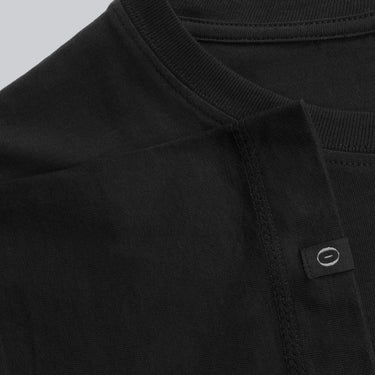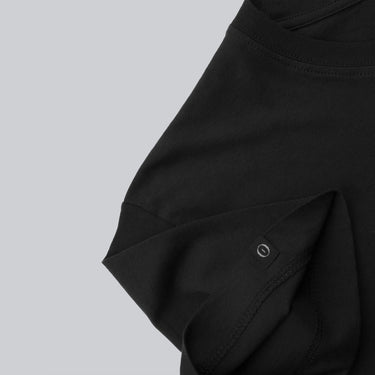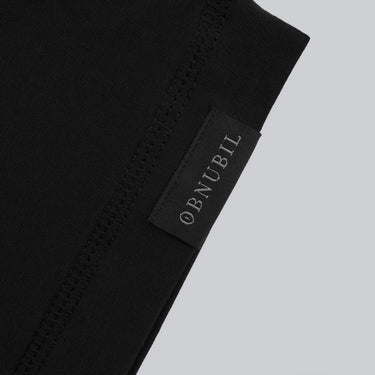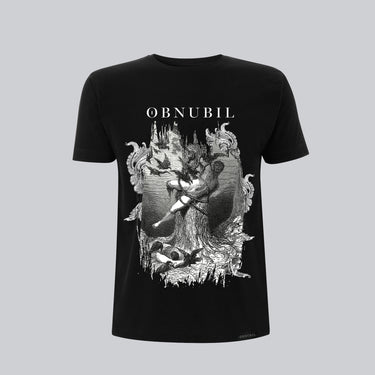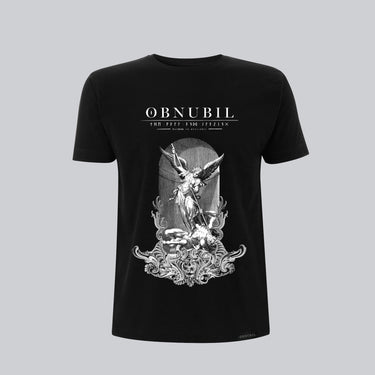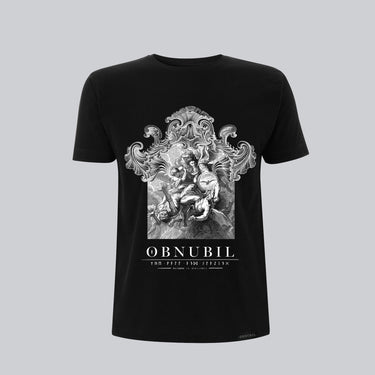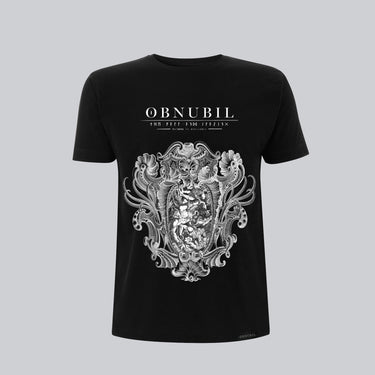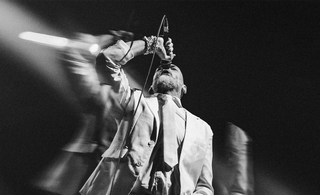
Few voices in metal carry the same weight of sorrow and poetic depth as Aaron Stainthorpe. As the frontman of the legendary My Dying Bride, Aaron has spent over three decades crafting mournful hymns that explore grief, love, faith, and the crushing beauty of despair. His unmistakable presence—both lyrical and vocal—has helped define the very soul of doom metal, transforming suffering into something strangely luminous. Now also lending his voice to the haunting new project High Parasite, Aaron continues to evolve, shifting from cathedral-like laments to gritty, post-industrial bleakness with chilling ease. In this deeply reflective interview, we explore the intersections of pain and poetry, the endurance of melancholic art in an increasingly chaotic world. Prepare to enter a realm where words bleed, silence speaks, and the human condition is laid bare beneath an ever-grey sky.

INTERVIEW
OBNUBIL: Hey Aaron! I really appreciate you diving into some questions with me today. Let’s start with your musical journey—every artist has that defining path that led them here. If we were crafting a cinematic retelling of your story, what would be the standout scenes? Was there a specific moment that completely rewired your understanding of music—maybe an album that hit like a thunderbolt? Or was your dive into music more of a slow, inevitable pull?
Aaron Stainthorpe: I think it began with Iron Maiden, specifically Rime of the Ancient Mariner, which I heard on the Friday Night Rock show with Tommy Vance (BBC Radio) way back in the dusty past. I thought it was the most wonderful composition and was keen to discover more and thus stumbled into the world of heavy metal. And the more I absorbed, the more I wanted to become a part of the scene – not just a listener, but a performer. The seed was planted and over time, grew into My Dying Bride.
OBNUBIL: Do you recall the very first moment you realized that sorrow could be beautiful—and that you wanted to give it a voice? Not simply as pain, but as something poetic, worthy of being held up to the light and sung about with reverence. Was there a specific moment—perhaps a certain sound, a passage in a book, a silence after loss—that unveiled this truth to you? Can you remember what it awakened in you?
Aaron Stainthorpe: It was a collision of things previously unrelated – until I found them. Learning to appreciate poetry at school I became fascinated with the more melancholic style, though I am unsure as to why and a similar thing happened in music. When things dropped in pace and the emotions grew, I loved it more and more. Come Candlemass and Lord Byron into my life and boom!! I never looked back.
OBNUBIL: If you could revisit a rehearsal room from the early 1990s, stepping inside like a ghost with a bottle of wine and a few minutes to speak with your younger self—what would you say to the version of Aaron who was just beginning to shape My Dying Bride? Would it be advice, a warning, or perhaps just a quiet affirmation? What would that moment feel like, standing between what was becoming and all that has been?
Aaron Stainthorpe: I would place a long arm about my younger shoulders and whisper – ‘You’ll do alright mate’. Then add with a sombre note – ‘but you will make zero cash!’ But we were never in it for the money otherwise we would have written 4 minute songs with catchy choruses. I may be pretentious to say but we were in it for the art. We had a voice and we wanted people to hear it. We had vision few before us possessed so we wanted to share this with the world. I’m extremely proud of everything MDB has achieved.
OBNUBIL: You've often spoken of poetry, faith, and death—three elements that don’t just coexist but intertwine in your work. How have your views on mortality evolved over the decades of writing about it? Do you think suffering still sharpens your creativity—or has it become something you understand more than you feel?
Aaron Stainthorpe: These subjects will haunt some and be water off a duck's back for others and I perhaps see myself as somewhere in the middle. Why worry if you cannot alter things? We must flow along the river and see where we end up. But talking about it opens it up and helps to make it less of a nightmare and more of a ‘regular’ topic in our lives. I may sound moribund to some but I am simply making life easier, I believe, for myself at least.

OBNUBIL: Your lyrics are dense, literary, even biblical in tone. Have you ever been tempted to write a novel or a book of poetry detached from music? Has there ever been a lyric that you now find difficult to sing because it holds too much of your past within it?
Aaron Stainthorpe: As I have always written but not had enough music for my words, there are naturally many more in the black book of words I keep within my home. In it are lyrics that are still waiting to be sailed into the music sea on a band vessel of some description. Others are poems, thoughts, reflections and insights into my mind. I have been lucky enough to perform these unspoken words, the last one was in a delightful church in Antwerp, Belgium which was warmly received by the crowd and I am hoping for more opportunities to perform spoken word in the future. A book is being worked on as we speak! And the song Two Winters Only is the one I never talk about. So, I’ll just step away.
OBNUBIL: There are moments in every artist’s life when silence becomes louder than sound—when the echoes of a finished song linger longer than the notes themselves. In those in-between spaces, between albums, between shows, even between verses—what emotion most often rises to the surface for you? Is it a sense of peace, as if something sacred has passed through you? Or is it restlessness, perhaps even fear, at the quiet that follows creation? What does that silence reveal to you about who you are—when no one is watching and the stage has gone dark?
Aaron Stainthorpe: It is a relief to get some private time and to reflect on what has been…before becoming excited about what is yet to come! The quiet time is much appreciated but it doesn’t last long as my mind is feverish with content. I am lucky enough to be working with some amazing musicians at the moment and am thrilled at some of the work I am creating and very much looking forward to sharing it with the world once completed. But those quiet times. You just can’t beat them.
OBNUBIL: If you could return to that precise, fragile moment when you first gave voice to your deepest sadness through a lyric—when pain became poetry and you chose to share it with the world—what would you most long to understand about the man you were then? Would you be curious about what drove him to expose his wounds so openly, or whether he truly understood the weight of what he was setting in motion? Would you search for his courage, his fear, or something even more elusive beneath the words?
Aaron Stainthorpe: I believe I have known who I am for a long time so reflecting on the more serious work, from the past, I see not a different person, but just a younger me. My soul is the same. My understanding is the same. I would not change a thing. I knew that performing the emotional work would be taxing on me as exposing your heart to hundreds and sometimes thousands of people in a live capacity, is perilous to my heart. Re-living the dark words is a burden which is why I have never truly enjoyed being on stage with My Dying Bride. I enjoy the final moments. I enjoy the ‘goodbye’.
OBNUBIL: Looking back now on As the Flower Withers, your first full-length album—do you feel that the young man who wrote it was working from a place of clarity, with poetic purpose and emotional direction, or was it chaos that drove those early creations? Were the lyrics deliberate spells, or fragments pulled from the storm of becoming an artist?
Aaron Stainthorpe: As a lover of poetry and the English language I always knew I had a better understanding and indeed access to the hidden gems of prose than a lot of people and I was going to use this to my advantage. When I began writing for My Dying Bride, I used all the very best literary tools I had in my arsenal to the seeming astonishment of the public as they were used to a more blunt and brutal approach as is the norm for heavy metal (not meaning to stereo-type anyone). My purpose and clarity were already formed way back then as was the emotional content considering who I was. Over time, naturally the emotions are enriched and thus the words now are populated with a different feeling to when I was younger as I have experienced so much more now. And my lyrics in ten years from now will reflect my life from now till then.
OBNUBIL: If your lyrics were to be unearthed and studied a century from now—long after your voice has quieted and the stage lights have gone cold—what would you most hope a reader, someone who never saw you perform or lived in your time, might come to understand about the man behind the words? Would you wish for them to see an artist, a seeker, a wounded soul, or perhaps just a human being doing his best to speak the unspeakable? What truth, hidden between metaphors and sorrowed imagery, would you most want them to feel in their bones?
Aaron Stainthorpe: I’d hope that a reader of my words in one hundred years would find something of themselves within the text, be it the rare hopeful moments of the more darker tones. But there is something for everyone in my work, I would like to think. It may seem all melancholy on the surface but underneath, it’s much darker! For many, the surface of my work is all they desire but others seek the hidden meaning and the deeper emotion lurking within and the enrichment for them is often fulfilled. I hope for tears for my work because tears created them.
OBNUBIL: The North of England, with its bleak coasts, forgotten ruins, and endless grey—how much of that external world bled into the internal one you shaped in your lyrics? Do you believe your surroundings helped carve your emotional voice, or was the melancholy already inside you, simply finding its reflection in those windswept places?
Aaron Stainthorpe: A little of both. My love of words began in Germany where I lived for the first fifteen years of my life and learnt all about the great poets at school, but the surroundings were not part of it. It was military and utilitarian. It wasn’t until I came to Yorkshire that the text jumped from my mind and onto the paper as the beauty and soul of this great land overtook me. Writing in this environment is a pure delight, even on the darkest of days, both metaphorically and meteorologically. The coast is remarkable. It draws me in constantly and I go to the shore as often as I can but the green hills, the lakes and the rivers that surround me are magical and where I wander, often with paper & pen hoping for inspiration, which is often not long coming. I could not live in a city! My creativity would suffer greatly.
OBNUBIL: How do you navigate silence now? Has your relationship with solitude changed since the band’s darker beginnings? Were there ever moments when My Dying Bride became a burden—too painful, too heavy—and you considered letting it go for good? What pulled you back?
Aaron Stainthorpe: My Dying Bride was formed not long after the death of my mother, and that shroud of horror draped the words I wrote from day one but allowed me to grieve in a unique way. Without the band, I would have suffered terribly. Or sought an art-form to suit my grief. I have always enjoyed the visual arts and indeed have created many pieces which reflect my thoughts when I could not summon the right words. What keeps me going is the necessity to purge my mind of the negative thoughts that build up over time and fill whichever vessel I choose that suits. Once words are written or images are painted, I feel relief and joy and become a playful human for some small amount of time.


OBNUBIL: Fans often speak of your music as something that has accompanied them through grief, depression, even near death. How do you process the weight of being a companion to so many unseen struggles?
Aaron Stainthorpe: I have been aware of the power of music, particularly ours, from the very first album, over thirty years ago when we received a hand-written letter (the internet was not a thing back then) from a chap who had sadly become suicidal but was pulled back from the abyss by the music of My Dying Bride. I felt elated that we meant so much to some people. And it has never stopped! For over three decades we have had a great many people contact us revealing how we ‘saved’ them from utter despair and destruction. For this, I will hold My Dying Bride in my heart forever, whatever our future.
OBNUBIL: What would you say has remained unchanged in your artistic soul since the very first My Dying Bride track was recorded? And, if your discography were a cathedral built from grief, which album would be the altar—and which would be the broken stained glass window? When you one day walk away from the stage for the last time, what do you hope will echo in the silence that follows?
Aaron Stainthorpe: The artistry I give has not changed a great deal in all the time I have spent here in My Dying Bride but the emotion has grown vastly as my age has acquired more thought and love and desire along with loss and grief. The book of Aaron has become a tome of emotion and I choose to tap it as often as needed to keep me sane. The church built from this would be small but poignant with Turn Loose the Swans the foundation and crypt and The Dreadful Hours being the glorious yet unnerving stained glass. And all the other albums and songs would be the matter and meaning for the rest of the architecture allowing visitors and pilgrims to walk the floor and take in the atmosphere. And what will be left? Perhaps an image of myself holding hands with an image of the viewer/listener walking off to the shore and gazing into the waters neither happy nor sad but reflective perhaps.



OBNUBIL: High Parasite seems to channel a different kind of darkness—more direct, more contemporary. What personal need or creative itch does that project satisfy that My Dying Bride doesn’t? Was there ever a time when you felt that the emotional language of doom metal had exhausted itself for you—and is that what led to High Parasite’s formation? How does it feel to create something new while being so deeply associated with a legacy?ay from the stage for the last time, what do you hope will echo in the silence that follows?
Aaron Stainthorpe: High Parasite originally came to me as a demo song from a friend who asked ‘can you do some death metal vocals on this please as I can’t do it?’ So I did. Then another song came etc… and off we went. It was still his band until the record labels got interested and then I sort of became a member. I had no idea what I was letting myself in for but I ran with it all the same and I am glad I did as it has opened a whole new world for me and I am loving it! The energy given off by not only the music, but the other (younger!) band members is infectious and has given me a drive and youthful vigour I have not had for decades! I didn’t realise until recently that I needed High Parasite! I wasn’t stagnated in My Dying Bride by any means, as our last album shows, but it appeared that I did need something else in my life to keep me alive and High Parasite delivers that. And I must point out that the creation of High Parasite has nothing at all to do with the hiatus I am on with My Dying Bride. My Dying Bride has had a big internal argument which we all hope will be settled in the near future. shore and gazing into the waters neither happy nor sad but reflective perhaps.
OBNUBIL: To finish off, I’d love to hear about what the future holds for you. Are there any exciting projects, collaborations, or upcoming releases that you’re currently working on? Anything followers should keep an eye out for in the near future?
Aaron Stainthorpe: The second High Parasite album is currently being written and 2026 will be our biggest year to date. I am collaborating with Mark Deeks from Ard on some seriously melancholic music and am performing my poetry at more venues with amazing musicians like Darkher and Jo Quail to name but a few. And working on a poetry book. And doing a few guest appearances too. There is a brilliant Boney M cover coming very soon! I have never been more creative in my whole life!
OBNUBIL: It’s been an absolute pleasure getting to learn more about you, Aaron! Thank you so much for sharing your time and thoughts. Before we wrap up, is there anything you'd like to share with the readers or a message for your followers?
Aaron Stainthorpe: Thank you for your time and it has indeed been a pleasure. Many thanks to the fans of My Dying Bride and High Parasite for your amazing support. My artwork can be seen at www.azzron.com and keep an eye out for my solo live performances. Cheers to all.
Interview done May 2025. Cover photo by Nachtfrost Visuals, others Unknown.



